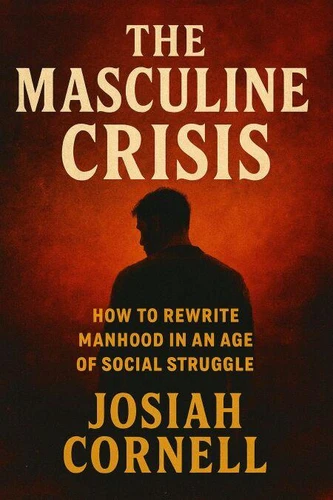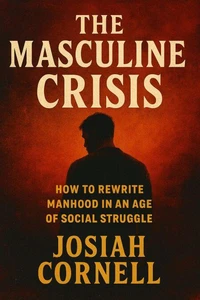- Accueil /
- Josiah Cornell
Josiah Cornell

Dernière sortie
The Masculine Crisis: How To Rewrite Manhood in an Age of Social Struggle
Masculinity in Crisis - A Rewriting of Manhood by Josiah Cornell offers an in-depth exploration of contemporary masculinity. This book combines personal stories, sociocultural analysis, and candid reflections to challenge and redefine outdated ideals associated with manhood, such as strength and dominance. Instead, it emphasises the importance of vulnerability, empathy, and self-discovery. Amidst significant societal shifts, traditional definitions of masculinity are increasingly scrutinised.
Many men experience confusion, anger, or isolation as they navigate these changing norms. Cornell not only brings attention to these feelings but also investigates their roots. His extensive experience in various fields, including prisons, probation services, and domestic violence prevention, informs his analysis of how cultural conditioning, trauma, and emotional suppression have led to a generation of men feeling disassociated from their societal roles.
He highlights the personal costs of emotional repression, illustrating how it often results in loneliness and aggressive behaviour. Beyond critique, Masculinity in Crisis advocates for transformative change. Cornell redefines bravery as the willingness to be vulnerable, encourages new paradigms of fatherhood and brotherhood, and promotes genuine connections among men. He invites them to explore and articulate their emotions more fully.
The book addresses pressing issues such as male loneliness, the connections between masculinity and violence, and mental health challenges that disproportionately impact men. Interestingly, it conveys a message of hope, demonstrating that men can forge new identities that honour their true selves while embracing their masculine essence. As men redefine their identities, the text suggests that society can also evolve and adapt in response.
Cornell's work shifts the discourse from "what's wrong with men?" to a more constructive question: "what has been done to men, and how can we effect meaningful change?" This book is relevant not only for professionals in social care, education, psychology, or justice sectors but also for anyone interested in the ongoing evolution of gender and identity. Ultimately, Masculinity in Crisis serves as an insightful examination, a compelling call to action, and a practical guide for a society ready to redefine itself, one individual narrative at a time.
It encourages readers to engage in essential conversations about masculinity and its future, focusing on understanding, healing, and growth.
Many men experience confusion, anger, or isolation as they navigate these changing norms. Cornell not only brings attention to these feelings but also investigates their roots. His extensive experience in various fields, including prisons, probation services, and domestic violence prevention, informs his analysis of how cultural conditioning, trauma, and emotional suppression have led to a generation of men feeling disassociated from their societal roles.
He highlights the personal costs of emotional repression, illustrating how it often results in loneliness and aggressive behaviour. Beyond critique, Masculinity in Crisis advocates for transformative change. Cornell redefines bravery as the willingness to be vulnerable, encourages new paradigms of fatherhood and brotherhood, and promotes genuine connections among men. He invites them to explore and articulate their emotions more fully.
The book addresses pressing issues such as male loneliness, the connections between masculinity and violence, and mental health challenges that disproportionately impact men. Interestingly, it conveys a message of hope, demonstrating that men can forge new identities that honour their true selves while embracing their masculine essence. As men redefine their identities, the text suggests that society can also evolve and adapt in response.
Cornell's work shifts the discourse from "what's wrong with men?" to a more constructive question: "what has been done to men, and how can we effect meaningful change?" This book is relevant not only for professionals in social care, education, psychology, or justice sectors but also for anyone interested in the ongoing evolution of gender and identity. Ultimately, Masculinity in Crisis serves as an insightful examination, a compelling call to action, and a practical guide for a society ready to redefine itself, one individual narrative at a time.
It encourages readers to engage in essential conversations about masculinity and its future, focusing on understanding, healing, and growth.
Masculinity in Crisis - A Rewriting of Manhood by Josiah Cornell offers an in-depth exploration of contemporary masculinity. This book combines personal stories, sociocultural analysis, and candid reflections to challenge and redefine outdated ideals associated with manhood, such as strength and dominance. Instead, it emphasises the importance of vulnerability, empathy, and self-discovery. Amidst significant societal shifts, traditional definitions of masculinity are increasingly scrutinised.
Many men experience confusion, anger, or isolation as they navigate these changing norms. Cornell not only brings attention to these feelings but also investigates their roots. His extensive experience in various fields, including prisons, probation services, and domestic violence prevention, informs his analysis of how cultural conditioning, trauma, and emotional suppression have led to a generation of men feeling disassociated from their societal roles.
He highlights the personal costs of emotional repression, illustrating how it often results in loneliness and aggressive behaviour. Beyond critique, Masculinity in Crisis advocates for transformative change. Cornell redefines bravery as the willingness to be vulnerable, encourages new paradigms of fatherhood and brotherhood, and promotes genuine connections among men. He invites them to explore and articulate their emotions more fully.
The book addresses pressing issues such as male loneliness, the connections between masculinity and violence, and mental health challenges that disproportionately impact men. Interestingly, it conveys a message of hope, demonstrating that men can forge new identities that honour their true selves while embracing their masculine essence. As men redefine their identities, the text suggests that society can also evolve and adapt in response.
Cornell's work shifts the discourse from "what's wrong with men?" to a more constructive question: "what has been done to men, and how can we effect meaningful change?" This book is relevant not only for professionals in social care, education, psychology, or justice sectors but also for anyone interested in the ongoing evolution of gender and identity. Ultimately, Masculinity in Crisis serves as an insightful examination, a compelling call to action, and a practical guide for a society ready to redefine itself, one individual narrative at a time.
It encourages readers to engage in essential conversations about masculinity and its future, focusing on understanding, healing, and growth.
Many men experience confusion, anger, or isolation as they navigate these changing norms. Cornell not only brings attention to these feelings but also investigates their roots. His extensive experience in various fields, including prisons, probation services, and domestic violence prevention, informs his analysis of how cultural conditioning, trauma, and emotional suppression have led to a generation of men feeling disassociated from their societal roles.
He highlights the personal costs of emotional repression, illustrating how it often results in loneliness and aggressive behaviour. Beyond critique, Masculinity in Crisis advocates for transformative change. Cornell redefines bravery as the willingness to be vulnerable, encourages new paradigms of fatherhood and brotherhood, and promotes genuine connections among men. He invites them to explore and articulate their emotions more fully.
The book addresses pressing issues such as male loneliness, the connections between masculinity and violence, and mental health challenges that disproportionately impact men. Interestingly, it conveys a message of hope, demonstrating that men can forge new identities that honour their true selves while embracing their masculine essence. As men redefine their identities, the text suggests that society can also evolve and adapt in response.
Cornell's work shifts the discourse from "what's wrong with men?" to a more constructive question: "what has been done to men, and how can we effect meaningful change?" This book is relevant not only for professionals in social care, education, psychology, or justice sectors but also for anyone interested in the ongoing evolution of gender and identity. Ultimately, Masculinity in Crisis serves as an insightful examination, a compelling call to action, and a practical guide for a society ready to redefine itself, one individual narrative at a time.
It encourages readers to engage in essential conversations about masculinity and its future, focusing on understanding, healing, and growth.
Les livres de Josiah Cornell

5,99 €

5,99 €
